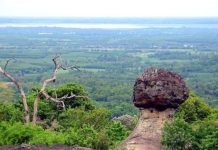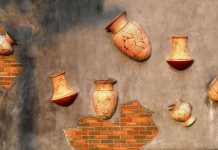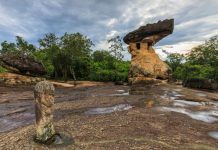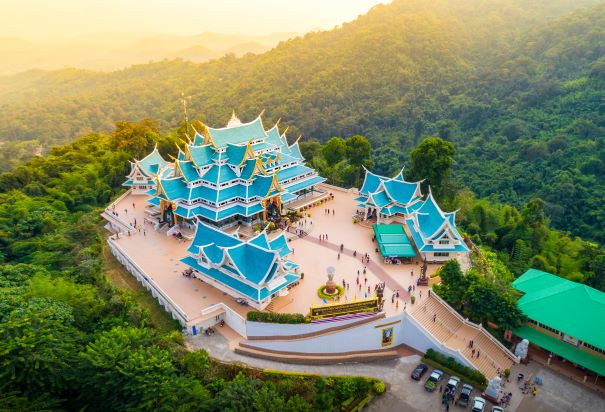
Wat Pa Phu Kon is nestled in the Na Yoong and Nam Som National Park at Na Yung district, Udon Thani province in the northeast of Thailand, which is the boundary of 3 provinces which are Udon Thani, Leoi, and Nong Khai. This sacred place has emerged as a result of the faith of the Buddhists who are concerned about the valuable benefits of the natural resources- forest, source of water, river, etc. that are endangered, as well as to follow the path of the HM King Rama 9 to reserve those natural resources to be as the heritage for the next generations. Moreover, this religious place is also perfect for any pilgrims as a meditation retreat.
About Wat Pa Phu Kon
In 1984, Phra Ajaan Fan Ajarayo, one of the famous Buddhist philosophers in Vipassana Meditation assigned to the disciples to do the pilgrimage to the northeast of Thailand for about 10 days. Thus, Ms. Piyawan and Mr. Olarn Weerawan with the fellowship went to do the pilgrimage in the area of Sakon Nakhon and Udon Thani province. At that place, the fellowship visited at the forestry temple in Ban Na Kham Noi, Udon Thani and was very appreciative of the good practice of Phra Ajaarn Inthawai Santussago, the monk who lived in that temple. Therefore, they volunteered to support the temple in order to ask for permission to use the land under the reservation of the National Park to establish the forestry temple called Wat Pah Na Kham Noi. Together with reforestation of more than 750 Rai according to the regulations of the Royal Forestry Department in order to be a Buddhist and meditation retreat and residence for the monks.
After that, Phra Ajarn Inthawai guided the group to investigate Phu Kon forest which was under the process of sawmill concession at that time. The fellowship then made a decision to construct a temple. To do that they invited master Chali Dhiradhammo as a chief of the group, altogether with a process to ask a permission from the Royal Forestry Department to use the land in Na Yung – Nam Som National Park to build the temple in about 15 Rai and got the permission on January 9, 1987. Then, on November 11, 1987, the Ministry of Education addresses “Wat Pa Phu Kon” as a Buddhist Forestry Temple abidingly.
The Important of Wat Pa Phu Kon
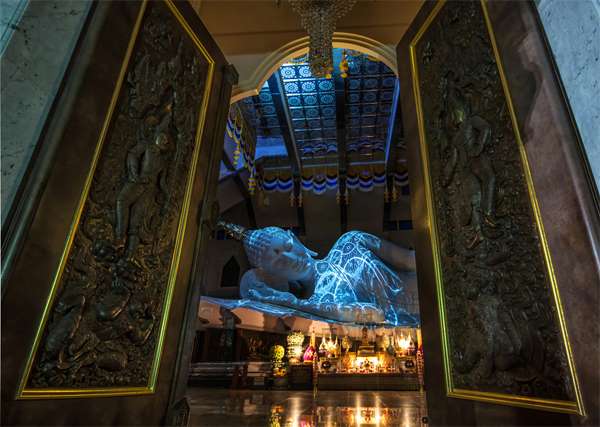
To conserve the forest to be well, the party had been trying so hard to ask for the permission to occupy the neighboring land which is located within the National Park, too. More than that, with the support from some people who held the position in the Ministry of Agriculture and Cooperatives and Ministry of the Interior, are Thaleung Thamrong-Navaswadhi, Chulanop Snidvongs Na Ayutthaya, Anan Anantakul and Jamnong Bhodhisero, therefore on June 22, 1988, there was the permission to access the area of the National Park in about 1,000 Rai to settle as the temple with its name as “Buddha Utthayarn Maha Rukkha Parichart Phu Kon”. Afterwards, there was a big support from next occupants of the Director General of the Royal Forestry Department and the Royal Irrigation Department, including ones in Royal Thai Police Department, Thai Army, Thai Air Force, Provincial Electricity Authority and TOT.
The temple was addressed the royal granting of the land to a particular temple by announcing in a royal decree on June 7, 1989. Then the establishing group set the ceremony to bury “Luknimit”, rounded stones in the ground to mark the sacred limits of the temple which was presided by Chulanop Snidvongs Na Ayutthaya, the Director General of the Ministry of Agriculture and Cooperatives at that time at the temple on January 13 – 14, 1990, as well as to found ‘Piyatham Foundation’ to facilitate and support any activities of the temple and community.
In addition, this temple had been the ascetic practice venue for the new monk from all 4 cadet schools who enter to the monkhood by the H.H. Somdet Phra Nyanasamvara Somdet Phra Sangharaj at Wat Bovoranives Vihara and then allow the new monks to do the practice at Wat Pa Phu Kon from 1994 for 5 years consecutively.
Wat Pa Phu Kon in Present Day
Presently, the temple consists of a 2-storey ordination hall, which is the place to do the religious ceremony at the upstairs and dining area for the monk at downstairs, 45 monk’s dwellings, 1 kitchen, 6 laic’s dwellings, 20 concrete water tanks, and numerous of restrooms that consume the water from mountain water pipeline system and then the Royal Irrigation Department made a renovation to strengthen it and allow it to facilitate the water to the Ban Na Kham village which is located about 4 km from the temple, too.
NOW, THE TEMPLE STILL MAINTAINS ITS HARMONY OF NATURAL RESOURCES TOGETHER WITH THE FAITH OF THE PEOPLE IN BUDDHISM, THE KING, AND NATURE.
What to See in the temple
1. Vihara of Wat Pa Phu Kon
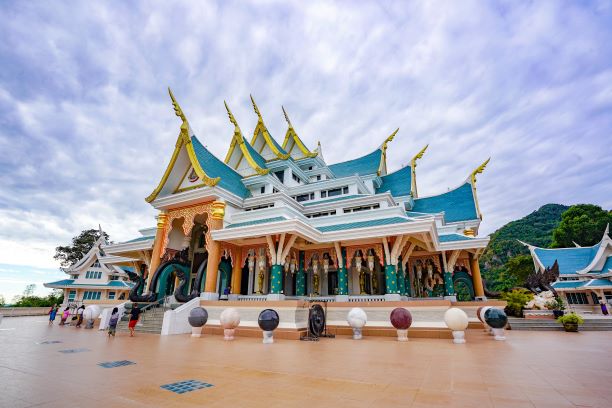
Vihara, where is the Buddha image hall, is very significant and magnificent. The venue is well designed for structural engineering, a marble Buddha image, the building, small pavilion and buildings surrounding the hillside. The sanctuary is Thai contemporary in Rattanakosin style with 3-sides of the gate. Inside is decorated with delicate and aesthetic art that describes the story in regards to Buddha’s history, ten incarnations of the Buddha and his principle. The history and the 10 incarnations are 22 lots of copper plate frescoes which refer to reconciliation with hard effort and sacrifice in each life with the green text on the white marble of 9 Attributes of the Buddha above each wall that is unique and charming.
2. The White Marble Reclining Buddha Image
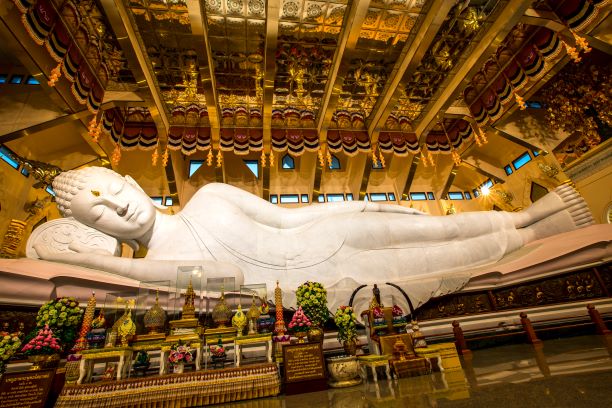
Moreover, there is the Buddha’s relic enshrined within the hairpin of Phra Ruang Rojana Sri Burabha, that is the main Buddha image housed in front of the pagoda ‘Phra Pathom Rattana Burabha Maha Chedi’, ‘Phra Buddha Sai Yas Lokkanad Sad Sada Muni, an artistic and durable white marble reclining Buddha image with a duration time of construction about 6 years. This reclining Buddha image is built on the occasion of 84th anniversary of King Rama 9 in order to be a remembrance and the Buddhism piece of art in the reign of the Rama 9.
3. Phra Pathom Rattana Burabha Maha Chedi
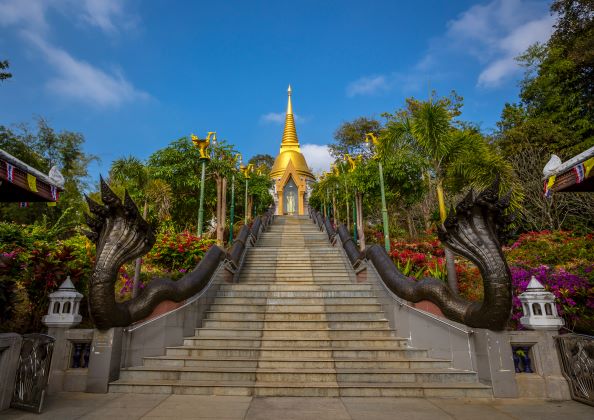
Other than the sanctuary and the reclining Buddha image that are very outstanding for this temple, there is also the Phra Pathom Rattana Burabha Maha Chedi that is very interesting, too. The pagoda is the place to enshrine the Buddha’s relic and numbers of the marble sculpture of the monk masters in Thailand. To access this part, the tourists need to walk up from the long staircase to the chedi. This is a crucial sacred place where is the center of faith among the Buddhist in the northeast, although it is established not long ago.
Travel to Wat Pa Phu Kon
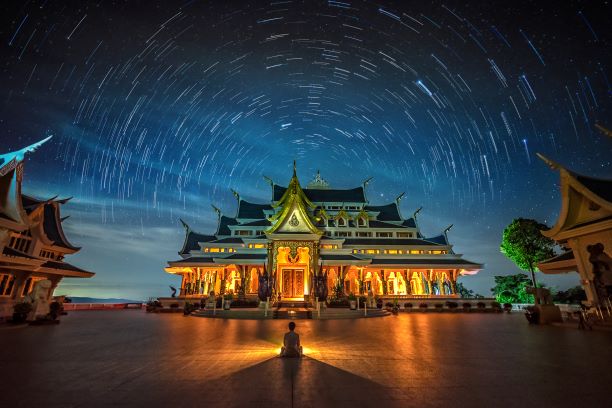
The route to go to the temple from Udon Thani uses the highway to go to Nong Khai until the 13th kilometer, then head left to Ban Phue and Na Yung district until arrives at Ban Na Kham Yai where there is a way to access Wat Pa Phu Kon. The total distance from Udon Thani city town to the temple is about 125 kilometers or about 1.45 hours. Any vehicles are able to access the temple but coach bus that need to park at the gangway and take the minibus service to the temple with the fare of THB20.

